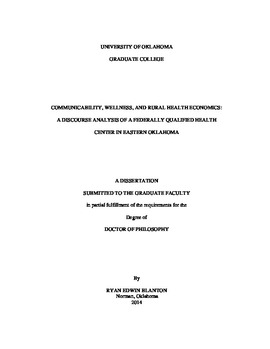| dc.description.abstract | Through an analysis of chronotopic discourses, or discourses that provide meaning in connection to time and space, focused on the (re)definition of rurality in relation to health, this dissertation examines the overall economic impact and return on investment of a Federally Qualified Health Center in eastern Oklahoma. Aside from improved access to healthcare and substantial economic impact, this Federally Qualified Health Center has positive effects on community, social, and political health within their service areas not previously identified in traditional healthcare studies. By examining the denotative negotiation of rurality and health within discourses as they pass through interdiscursive webs surrounding the Federally Qualified Health Center, it is clear that external spatiotemporally neutral biomedical discourses, or discourses that do not contextualize health within the history and place of patients, serve only to centralize healthcare outside the community, contextualizing such discourse as authoritative and tied to sociopolitical histories, and therefore incompatible with local understandings of health and wellness. Conversely, it is argued, discourses of health and wellness originating from the Federally Qualified Health Center, a position centered in the community, are contextualized within local chronotopes of rurality, place, and history. As the denotations of rurality, health, and healthcare share common chronotopic frames, these discourses empower the economic, community, social, and political health of the community. These discourses, it is argued, are shaped by, and in turn shape, spheres of communicability focused on wellness that decentralize medical authority and allow for the local production and prioritization of healthcare. It is further argued that the synthesis of a functionally oriented sociolinguistic and medical anthropology provides a new framework that contributes to broader academic discourses of rurality and rural health, especially in the era of health reform. | en_US |
